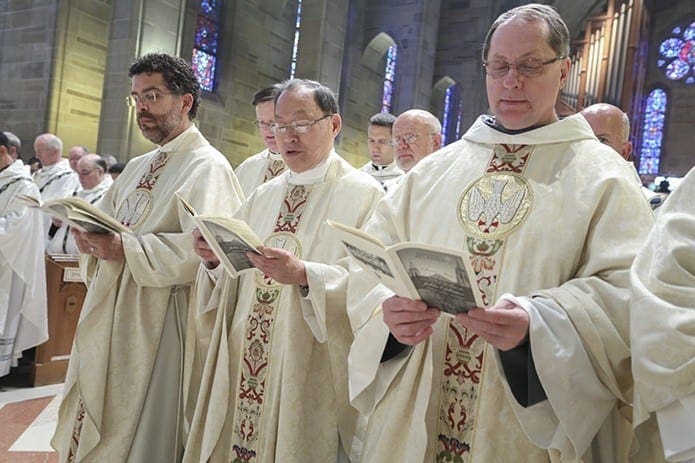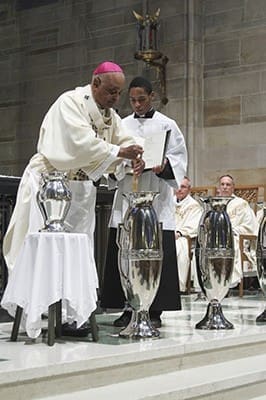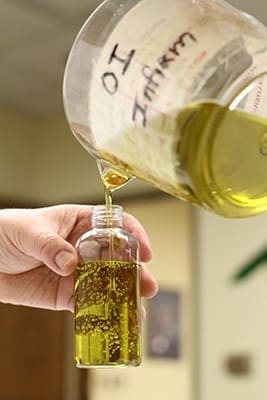 Photo By Michael Alexander
Photo By Michael AlexanderAtlanta
Renewal of sacramental life, priestly ministry celebrated in Chrism Mass
By NICHOLE GOLDEN, Staff Writer | Published April 2, 2015
ATLANTA—Throughout the coming year in the Archdiocese of Atlanta, the oils blessed at the annual Chrism Mass will be used as a balm to help those in need of renewal and as signs of sacramental graces.
During the March 31 Mass at the Cathedral of Christ the King, Archbishop Wilton D. Gregory blessed the oils to be used for the celebration of sacraments in every church, and priests renewed the promises made at their ordination.

Archbishop Wilton D. Gregory, left, stirs the chrism as seminarian Avery Daniel looks on during the March 31 Chrism Mass at the Cathedral of Christ the King, Atlanta. Photo By Michael Alexander
In addition to the blessing of the oils and consecration of the chrism, the Mass was the jubilee celebration of the ordinations of 11 priests: Father James L. Harrison, Father Edward D. “Ted” Johnson, and Father Richard Morrow, all celebrating 60 years; and Passionist Father Alberto A. Cabrera, La Salette Father Joseph Gosselin, Msgr. Henry Gracz, Father Richard A. Kieran, La Salette Father Paul Gerard Rainville, and Marist Father John J. Sullivan, all marking 50th anniversaries. Father Paul A. Flood and Father Juan Guerra, of the Legionaries of Christ, are celebrating 25th anniversaries of ordination.
The archbishop said that all share in the jubiliarians’ “special moment of joy.”
Turning to the blessing of chrism, he said, “Oil is very messy material. It is hard to contain.”
The fact that oil is messy makes it perfect for anointing, said the archbishop. He highlighted its sanctifying quality.
“We also believe it is transformative,” he said. “For in truth we all need these oils.”
The oils work to “seep” into the cracks and crevices to release our spiritual crustiness.
“It is the prayer of the Church that makes these oils beneficial for its people,” said Archbishop Gregory.
Auxiliary Bishops Luis R. Zarama and David P. Talley concelebrated the Mass along with the jubiliarians and priests of the archdiocese.
From Jerusalem to Rome to parishes around the world, the pope and local bishops carry out the annual custom of preparing and distributing to churches the holy oils. The Chrism Mass is usually celebrated on or before Holy Thursday, and in Atlanta on the Tuesday of Holy Week.
The oils include the oil of the sick, used in the anointing of the sick, the oil of catechumens, which is for those preparing to be baptized, and the chrism oil, which is consecrated and used for baptism, confirmation and holy orders.
The priests renewed their commitments made at ordination to be “more united with the Lord Jesus and more closely conformed to him.”
Following the renewal, three large vessels of oil were brought before the altar. The archbishop prayed over the vessels, asking God to bless the oil of the sick to deliver all from affliction, and the oil of the catechumens to give wisdom to all anointed.
During the consecration of the chrism, the archbishop poured balsam, an amber-colored perfume into the oil, and mixed them together silently, using an oar-like piece of wood.
Ana Paula Sanchez-Mejorada, a junior at Pinecrest Academy in Cumming, served as a lector for the Chrism Mass.
“It’s kind of an honor in a sense,” said Sanchez-Medjorada. “It’s really interesting to see how it all happens.”
Following Mass, the priests collect several ounces of each of the oils and chrism to take back to their respective parishes.
The official “oil pourers” were a crew of seven volunteers this year, led by cathedral parishioner Jackie Marcinko.
“I’ve helped during Holy Week for a long time,” said Marcinko, whom the other volunteers call “the head honcho.”
After the oils are blessed, the pourers go downstairs to pour them into color-coded bottles. The bottles are then placed into sealed bags for easy transport.
The pourers prepare more than 150 sets of oils. “It takes us a couple of hours total,” said Marcinko.

Cathedral of Christ the King parishioner Linda Rozakis pours the oil of the sick into clear, four-ounce, plastic bottles for the various archdiocesan parishes. Photo By Michael Alexander
Scriptures refer to ‘anointings’ with oil
The use of blessed oils in the church can be traced to ancient times.
Third-century writer and saint, Hippolytus of Rome, noted the blessing of the oils and how they were used in the early church. Later descriptions are found in the seventh and eighth centuries from the “Gelasian Sacramentary,” which among other items described early liturgical practices, prayers, rites and blessings of the Easter font and of the oil and prayers at dedication of churches.
Even before that, there are Old and New Testament scriptural references to “anointings,” suggesting the importance of holy oil in ancient and biblical cultures.
“First of all, you have the olive tree, which was plentiful around Jerusalem and all of the Middle East, and (olive oil) has always been used for food, heating and lamps, for healing of wounds and in the Scriptures—because of the context—used as a sign of God choosing a person or a people as his own,” said Msgr. Terence Hogan, dean of the School of Theology and Ministry at St. Thomas University in Miami, Florida.
Msgr. Hogan, also an adjunct assistant professor of liturgy at St. Vincent de Paul Regional Seminary in Boynton Beach, added that since early Christianity priests and bishops have been anointed during their ordination rites.
Virgin olive oil is used for the oil of the sick and oil of catechumens.
“The oil of chrism, is distinct in that it is mixed with a resin, balsam, giving it a sweet perfumed fragrance, after which the oil is consecrated by the bishop,” according to Msgr. Hogan.
“We say it is ‘consecrated’ because it is used to truly set apart a person, a bishop or priest when they ordained; it sets apart a person who is baptized and later it is used in the sacrament of confirmation; the bishop literally breathes upon that oil as a visible sign of the Holy Spirit coming down on the chrism oil,” he added.
Father Kochuparampil incardinated into archdiocese
Father James McCurry, the minister provincial of the Conventual Franciscans’ Province of Our Lady of the Angels, led a day of reflection for the priests prior to the Chrism Mass.
At the Mass, Archbishop Gregory also welcomed Claretian Father Jose M. Kochuparampil through incardination into the presbyterate of the Archdiocese of Atlanta. Incardination is the official change of the home diocese to which a priest belongs and requires a number of steps to complete.
Father Kochuparampil is currently parochial vicar at St. Michael Church in Gainesville. A native of India, he made his first vows as a member of the Claretian Missionaries in May 1979 and his perpetual profession in 1985. He was ordained to the priesthood in India in April 1987. After serving in India and then with the Claretians in Chicago, he came to the Atlanta Archdiocese in 2002. He has served in parishes in Stone Mountain, McDonough and Kennesaw as parochial vicar and celebrated his silver anniversary of priesthood in 2012.
Speaking from the ambo, the priest said he had a better idea of how difficult it is to be archbishop.
“Standing here itself is hard,” he said, adding, “The archbishop pronounced my last name better than I do.”
The priest said he was “immensely grateful to God” to be able to serve the people of the Atlanta Archdiocese.
Catholic News Service also contributed to this story.